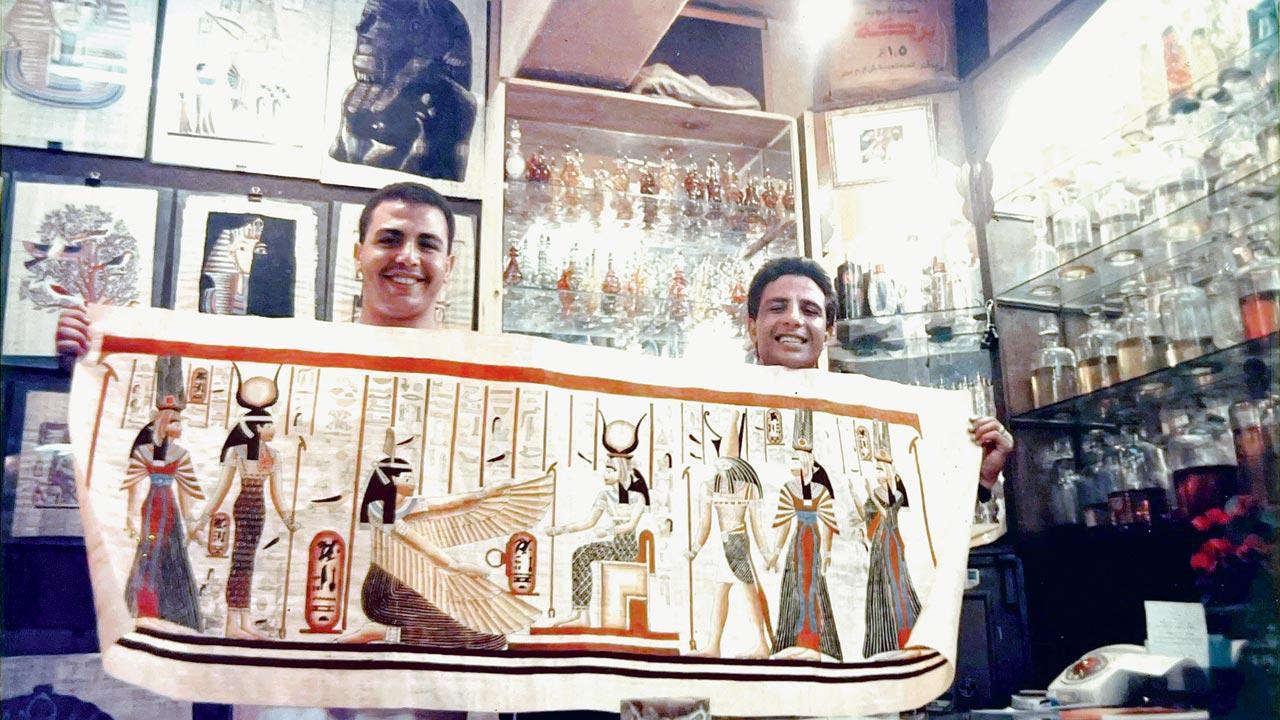As an Indian, I assumed bargaining ran in my genes. Then I found myself in Egypt, a country that has been ripping people off longer than we have

Hasan and Sabir, master bargainers, laid a neat trap into which I fell, smiling all the way to the abattoir. Photo by C Y Gopinath
 Everything, as you know by now, was invented in India. A stunning range of human achievements from plastic surgery, space travel, drones, linguistics and maybe even BBQ sauce was first invented here. No one dares dispute this.
Everything, as you know by now, was invented in India. A stunning range of human achievements from plastic surgery, space travel, drones, linguistics and maybe even BBQ sauce was first invented here. No one dares dispute this.
ADVERTISEMENT
One thing seems to be missing, though—the uniquely Indian science and skill of bargaining. There isn’t a shopkeeper or vendor who does not expect trouble when an Indian shopper ambles towards them. Few vendors survive such an encounter.
I assumed, without reason, that as a native Indian, bargaining ran in my genes and would emerge when the occasion demanded. It never crossed my mind that any other country might be better at bargaining than we were.
Then, one day, I found myself in Cairo, Egypt, a country that has been ripping people off longer than we have.
The trap was laid by a young man calling himself Sabir whom I met by the Nile. He claimed to be a student of Egyptology, researching papyrus at the family institute nearby. Of course, I immediately wanted to go there.
I was welcomed by Hasan, Sabir’s brother, dressed in a traditional white djellaba with headgear. The so-called ‘institute’, I noticed instantly, was just a typical tourist shop.
“Any friend of Abdul’s is a friend of mine,” Hasan said warmly. Was the boy an Abdul or a Sabir?
I started off with some blunt honesty. “Look,” I said. “I have absolutely no intention whatsoever at all of buying any kind of thing in the least from this shop or any other shop.” I paused for breath. “Got it?”
Hasan’s hand flew to his mouth, offended. “Buy?” he said. “We are students of papyrus, not salesmen.”
Hasan emptied several shelves of papyrus paintings onto the glass counter, some of them nearly ten feet across.“Tell me which ones catch your eye and I’ll tell you the stories behind them.”
I chose four that looked interesting, not realising I had entered Phase 2 of the entrapment. Hasan now knew which paintings I might finally buy.
“You have a connoisseur’s eye for true beauty,” Hasan complimented me.
“This,” said Hasan, “is the jackal-headed God Anubis, who weighs dead Egyptians’ hearts against truth, while the baboon-god Thoth records the results. Those who fail are eaten up by a beast called the Devourer of Souls.”
“It costs a mere US$70,” he added.
“Let’s stop these games,” I said crisply. “I’ve told you already—no buying anything. In my pocket are 60 Egyptian pounds. The rest is in US dollar traveller’s cheques at the Windsor Hotel.”
“We take traveller’s cheques too,” said Hasan.
“Not buying,” I emphasised. “Not.”
“This second painting you have liked,” he continued as though I’d said nothing, “is from the tomb of Rameses VI. It shows the sky Goddess Nut, who swallows the sun each evening. She gives birth to it again each morning. That would be this brown disc. Also US$70.”
Hasan was playing a subtle and refined game of bargaining that Egyptians have perfected over millennia. The only rule is that there are no rules. If your bargaining shows the mark of a master, you will be applauded as you depart. However, impatience and rudeness will reveal your low breeding and you will be dismissed as a khagawah, a foolish, rich person.
Unaware that my bluntness was being misread as a strategy, I now said, “We have had a death in our family recently. My father passed away. Buying art in this year would dishonour the departed soul.”
Hasan shook his head in admiration, not believing a word I’d said.
“My uncle too passed away,” he said mournfully. “He was almost like a father. As you know, death is a very costly affair in Egypt. Now I have to make at least one small pyramid for him. And now another uncle is complaining of a pain in his chest.”
A heavy, manufactured silence hung between us.
“What a coincidence,” he said gently. “Your dear father. My beloved uncle. Both gone forever. That is why I make this final offer to you—four extraordinary paintings for only 60 Egyptian pounds, which you have here with you, and an additional 150 dollars, which we can collect from your hotel.”
Meanwhile, I seemed to have undergone a transformation. Thinking ahead to my eventual destination, Chicago, I was wondering what would be so bad about buying a few paintings as gifts.
“Very well,” I said. “Perhaps I might blow 20 Egyptian pounds and 50 US dollars. I say maybe.”
Suddenly, we were firing numbers at each other, inching towards a sale price. “My last offer is 50 Egyptian pounds and 50 US dollars,” he said. “For three paintings. Only because Mustapha likes you so much.”
Abdul or Sabir or Mustapha, all pretence of studenthood abandoned, grinned openly at me.
As I left, arms loaded with papyrus paintings I had never planned to buy, Hasan gave me a brotherly bear hug.
“You are a very good negotiator,” he said. “Almost like one of us. Almost. One cannot expect too much from a country that has never built pyramids.”
You can reach C Y Gopinath at cygopi@gmail.com
Send your feedback to mailbag@mid-day.com
The views expressed in this column are the individual’s and don’t represent those of the paper
 Subscribe today by clicking the link and stay updated with the latest news!" Click here!
Subscribe today by clicking the link and stay updated with the latest news!" Click here!







